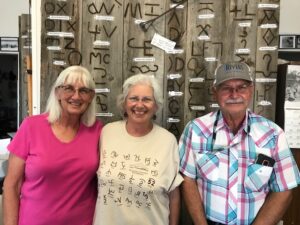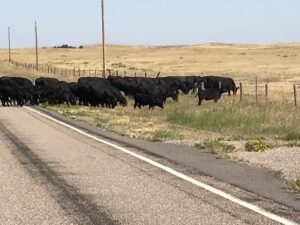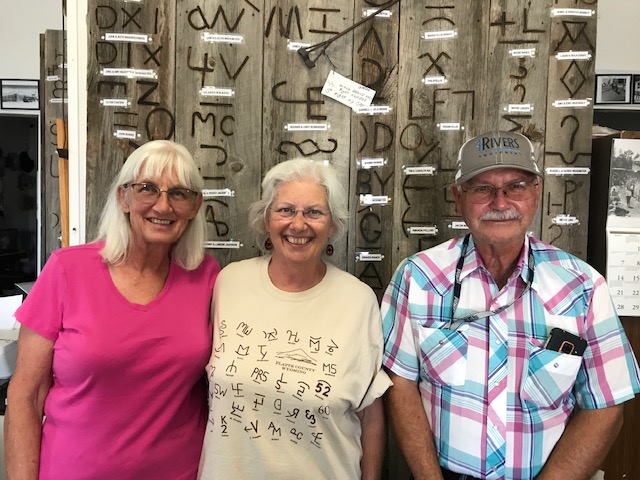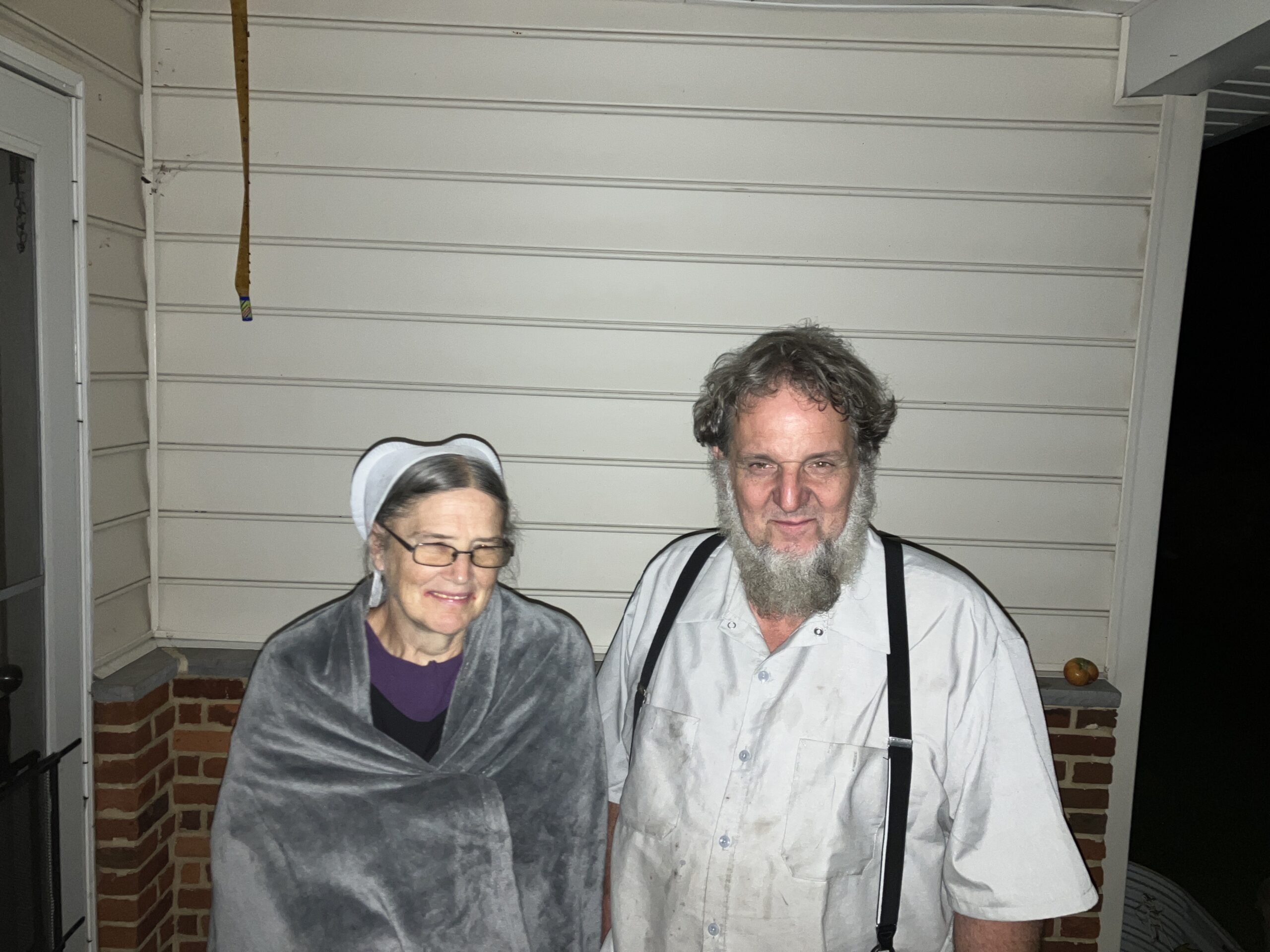Chugwater, Wyoming is farm and ranch country, mostly dry farming, so rain is a constant part of the discussion. Cattle need 10-15 acres for every cow-calf pair. Keith Miller and two sisters, Lucinda Houtchens and Teresa Baker, all grew up together, went to school together, and helped each other on their family ranches. During our interview and over lunch they were almost finishing each others’ sentences, so I decided not to try to unwrap and attribute each quote separately. They were all born and raised on ranches near Chugwater and their families were original homesteaders in the early 1900’s.

Lucinda Houtchens, Teresa Baker, and Keith Miller at the Chugwater Museum
“We worked. We all worked very hard. We were our parents hired hands. You went to school and then you go straight home. There were chores on the ranch or the farm. My dad always felt like we were too busy so we never knew what a vacation was. I remember my folks taking one vacation over the weekend. There just wasn’t time to do that.”
“I felt so fortunate to grow up here. I had so much freedom even as at little tike, you know, before I was old enough to go to school even, I had a little black horse, and my mom would pack me lunch and say be home by dinner. I had about three or four sections out there. I could go explore, check out some of the road, just go explore and watch game and all kinds of things.”
“We’d go to each other’s ranches and visit with each other. Working visits more. We knew all the parents and they knew us. They were all strict parents. You knew you didn’t pull something at somebody else’s house. I mean, you’re on better behavior at a friend’s house.”
“Our granny was very, very frugal, you know, waste not, want not. Everybody grew up in hard times, so nothing got thrown away. You didn’t throw away a bolt. We spent hours pounding out bent nails.”
“Grammy taught us to be generous with our time. Because she always had time for us. You know, to just be there for people, make time for people. If someone in the community needed anything, you were there for them, no question.”
“I think our generation was taught big time to respect your elders. Big time.”
“You know every inch of that land. You have chores and you ride every day in the Fall. You get so attached. Farmer and ranchers are the most conservation minded people. They know how to use the land to survive on it. But boy, they’re not going to abuse it.”
“Now we call it neighborhood watch. Back then it was just that everyone looked out for all the kids. Yeah, we got in trouble. I bought some beer one time when I was underage. The storekeeper sold me the beer, but my parents knew about it before I got home.”
“We didn’t have any bigotry here. We were tall too much alike. We had one or two Mexican families that worked on the railroad, but they weren’t threatened by the community. We had poor families, and some kids had nicer cars than I did. Everybody felt they could succeed. You know, I mean, everybody was self-confident.”.
“I was a proctor in the football dorm at the University. It was in 1969. We had 14 Black players on the team and the team decided not to play against BYU because BYU did not have Black players. It was a big deal, and the Black athletes would not talk to me about it, or even talk to me period because I was White. That’s when I really started seeing bigotry because of skin color. All of a sudden they were told by somebody because they had an agenda, I thought, boy, that’s a shame. Because we’d never experienced anything like that around here.”
“In Church, all the little songs we sang were very inclusive, like, ‘Jesus loves little children, all the children of the world red and yellow, black and white. They are precious in his sight.’ I mean, we grew up with those types of songs. I think we went away to college with no biases or anything. But now I think there’s something afoot trying to divide us all now. I don’t know if it’s the elites against all the rest of us. I’m not sure; I can’t figure that out yet. But there’s something amiss, well, I think it’s, it’s a means of gaining political advantage.”
“From whatever perspective you are, we need statesmen I don’t see many statesmen in the political system. When I was growing up, my grandparents were Democrats because of FDR but they trusted Republican leaders as well. They may have a different view of the situation, but they never doubted that those people weren’t going to do right by them as well. And I don’t think there’s that feeling now. When we were growing up, you were never allowed to take your eye off the ball of what was the roots of this community right here.”
“It’s the business of the media to try and get viewers and they can get viewers by making things that breeds crazy. Just craziness. You know, the crazier the better for them to report on.”
 I had an afternoon interview session out on a cattle ranch a dozen or so miles east of Chugwater, three family members: dad, mom, and their son who run the whole ranch: 13,000 acres, and the current town mayor. We got to the ranch just in time to see them get the herd across the road, except for one ornery calf that took two four-wheelers to corral him to the right gate, while Keith used the truck like a cutting horse to keep the rest from going down the road. I stepped in fresh cow poop when I got out to shut a gate. The family seemed a bit shy about being recorded, so I did not, and am not using their names. But we had a great discussion:
I had an afternoon interview session out on a cattle ranch a dozen or so miles east of Chugwater, three family members: dad, mom, and their son who run the whole ranch: 13,000 acres, and the current town mayor. We got to the ranch just in time to see them get the herd across the road, except for one ornery calf that took two four-wheelers to corral him to the right gate, while Keith used the truck like a cutting horse to keep the rest from going down the road. I stepped in fresh cow poop when I got out to shut a gate. The family seemed a bit shy about being recorded, so I did not, and am not using their names. But we had a great discussion:
We grew up knowing right from wrong. Usually no one told you, until you did something wrong and then you heard about it or were punished and that is how you learned. The other big thing was honesty; telling the truth and following through on what you said you were going to do.
Small communities work because people show up and take on jobs that need doing. They volunteer for the fire department and to serve on boards and committees that make civic systems effective. In the rising generation there seems to be less value placed on doing these jobs. We had a big grass fire last year and a lot of people showed up to fight it. Afterwards we had many ask to join the volunteer fire department and we took them on. But they don’t show up to meetings and training. The old guard is getting older or passing along, and the younger people don’t seem to have the same commitment to following through when they say they are going to do something.
People are moving here who may not have grown up in a small town. Maybe they are retiring or they are moving because they can work remotely. But they don’t understand that in a small town like this we have to do a lot of things for ourselves as a community. They seem to expect that someone else will make it work, and that is not how a small town can function.”
Schools are at the heart of any rural town. Take away the school and the town is probably going to die. We have a real commitment to education here.”













Leave A Comment